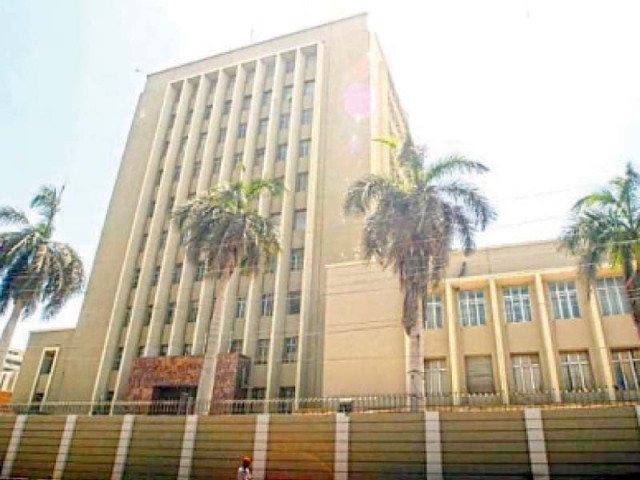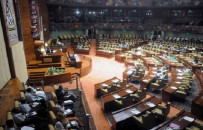Policy rate set at 20.5% after 1st cut in nearly 4 years
Central bank revises down mark-up by 150bps

With the inflation rate easing and the economy holding in, the State Bank of Pakistan on Monday cut its key policy rate by 150 basis points to 20.5% — its first rate reduction in nearly four years.
The decision to cut the key rate comes two days ahead of the announcement of annual budget and a week after data showed inflation slowed to a 30-month low of 11.8% in May.
The much-awaited move would help reduce the cost of borrowing for businesses and households and provide a change to the economic growth to pace up in the next fiscal year, starting July 1.
In its report, the SBP reported the country has provisionally achieved a moderate growth at 2.4% in the outgoing fiscal year 2023-24. The cut in the rate is estimated to have reduced interest payment on debt by around Rs700 billion in the next one year, creating fiscal space for the government to invest in economic activities and/or ramp up social spending on needy people.
The new policy rate would become effective from Tuesday (June 11).
The State Bank had announced seven monetary policies in the past 11-month, maintaining the rate record high at 22% since July 2024.
The bank had raised the rate by 15 percentage points cumulatively in the past three years in an effort to tighten the monetary policy and control inflation that hit a multi-decade high of 38% in May 2023.
Debt repayment, stable FX
SBP Governor Jameel Ahmad said the country had made arrangements with regard to honouring foreign debt obligations amounting to $10 billion in June-July 2024 on time.
While briefing analysts on the latest monetary policy statement, the SBP governor said Pakistan was scheduled to repay $1 billion in the ongoing month of June alone. In spite of that, he added, the country’s foreign exchange reserves (held by the SBP) would remain stable at around the current level of $9 billion by the end of outgoing fiscal year on June 30, 2024.
Samiullah Tariq, Head of Research at Pak-Kuwait Investment Company, quoted the SBP governor as saying that the country would settle foreign debt repayment amounting to $10 billion due in June-July 2024 by paying $2 billion and getting the remaining $8 billion rolled over in the next two months. “The rollover process has been initiated.”
Arif Habib Limited Head of Research Tahir Abbas citied the governor as saying that Pakistan has already paid $10.8 billion in foreign debt and interest payment on the debt in the first 11 months of the outgoing fiscal year 2023-24.
Besides, it got rolled over another $11-12 billion in the 11-month period, as the country was to repay a total of $24.5 billion in principal repayment and in interest payment on the debt.
Abbas said Pakistan would pay another $1 billion alone in the ongoing month of June. Despite the repayment, the country’s foreign currency reserves (held by the SBP) would remain stable at around the current level of $9 billion by end of the outgoing fiscal year on June 30, 2024.
Topline Securities CEO Muhammad Sohail said the central bank had cleared almost all the backlog of dividends and profit repatriation by foreign firms operating in Pakistan.
In May alone, the dividend payments were around $1 billion, taking the total payments to approximately $2 billion so far in the outgoing fiscal year 2023-24 to date, he said.
While other analysts said the central bank had cleared the entire backlog of the profit and dividend, reducing the burden on the foreign exchange reserves going forward.
Pakistan has approached the IMF for a new loan programme. The new package would ensure continuity of paying foreign debt on time and provide some financial space to ramp up economic activities.
The programme, however, would be won on tough conditions which may increase the burden of repayment and interest cost, keep inflation elevated and pull more households below the poverty line, according to a section of economists.
Monetary policy statement
In its monetary policy statement, the central bank said the monetary policy committee (MPC) viewed some upside risks to the near-term inflation outlook associated with the upcoming budgetary measures and uncertainty regarding future energy price adjustments.
“Notwithstanding these risks and today’s decision, the committee noted that the cumulative impact of the earlier monetary tightening is expected to keep inflationary pressures in check,” SBP monetary policy statement reads.
The MPC noted the following key developments since its last meeting. First, the real GDP (gross domestic product) growth remained moderate at 2.4% in FY24 as per provisional data, “with subdued recovery in industry and services partially offsetting the strong growth in agriculture”.
Second, reduction in the current account deficit has helped improve the FX (foreign exchange) reserves to around $9 billion “despite large debt repayments and weak official inflows”.
The government has also approached the IMF for an Extended Fund Facility programme, which is likely to unlock financial inflows that would help build FX [foreign exchange] buffers. Lastly, international oil prices have declined, whereas non-oil commodity prices have continued to inch up.
Headline inflation decelerated to 11.8% in May 2024 from 17.3% in April. Besides the continued tight monetary policy stance, the sharp reduction was also driven by a sizeable decline in prices of wheat, wheat flour and some other major food items, along with the downward adjustment in administered energy prices.
The committee noted that the real interest rate still remains significantly positive, which is important to continue guiding inflation to the medium-term target of 5 -7%. The Committee also emphasized that “the future monetary policy decisions will remain data-driven and responsive to evolving developments related to the inflation outlook.”
Taking into account the developments in the first nine months, the FY24 growth is provisionally estimated by PBS at 2.4% against a contraction of 0.2 percent in FY23.
Almost two-thirds of this recovery was explained by improvement in the agriculture sector. “For FY25, the MPC expects economic growth to remain moderate”.


















COMMENTS
Comments are moderated and generally will be posted if they are on-topic and not abusive.
For more information, please see our Comments FAQ